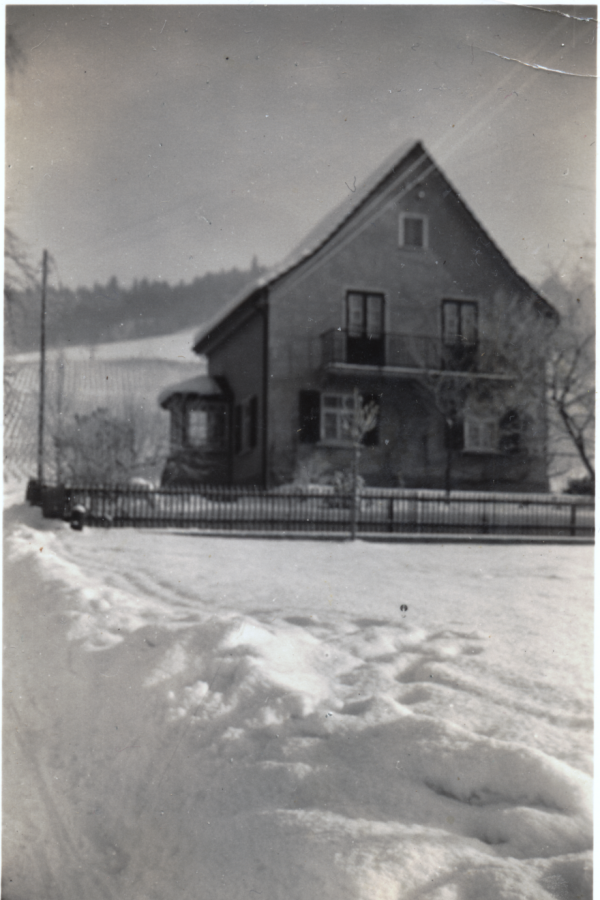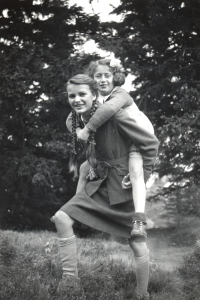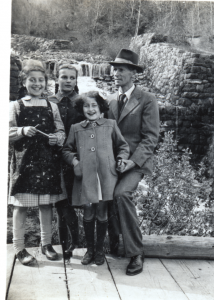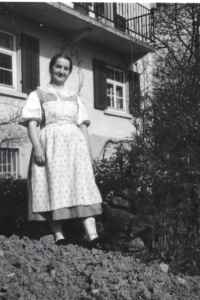You can read the previous part of Olga’s story here “Olga Samuels. Entry into neutral Switzerland”
Life in Weiningen (Canton Zurich): 1944-1946
My Swiss Mütti, Frau Stuessi, came to fetch me in Wald and took me home with her to Weiningen, a typical small Swiss village, where I was to spend 1 ½ happy years. Her husband, the soldier who had talked to my mother whilst walking in Lugano, a tall skinny man, her son Hans and her daughter Elsbeth were to be my foster family for quite some time. The first week-end there was strange and very unhappy for me. My parents had been allowed to visit me that first week-end; instead of enjoying that happy chance, I remember having cried most of the time, thinking that after that week-end, I was not going to see them for a very long time.
However, the kind and loving Swiss family, their sweet house, garden and homemade swimming pool, my first school teacher, who spoke Italian and all the children in the school, who had never seen anybody like me….with brown curly hair, rather than blond straight platted hair, who was a war refugee etc., all made immediately so much fuss of me that my initial unhappiness quickly disappeared. In a month I became quite fluent in Swiss German, attended the 3rd class in primary school and made many friends with whom I walked to and from school and played with after it. Soon they all started to call me Olgeli.
My foster brother and sister though, were slightly jealous of the attention given to me by their parents and the village in general and our relationships were sometimes difficult, but not to the point of spoiling my stay with them. Elsbeth, who was six years older than me and learnt to play the piano, used to teach me all that her teacher taught her and she also taught me to swim in their small pool. Hans, on the other hand, who was 12 years older than me, never had much time for me, except for annoying me and I remember once he pulled me up from the floor, where I was sitting….. by my hair.
The parents were lovely people, completely vegetarian; they were observant Protestants and always helped village people in need of care. The Mütti often wore the typical costume of Canton Zurich, called tracht and I seem to always see her in my memories wearing it. At first, they thought I was rather a spoiled only child and tried, therefore, right from the beginning, to improve my behaviour with patience and loving care. A Jewish organisation from Zurich regularly organised for someone to come and teach me and another Italian refugee girl from a neighbouring village to read Hebrew texts. My foster family always encouraged me to say my Jewish prayers, but, at the same time, let me participate in their Protestant rituals. Christmas celebrations and singing in the local church on Christmas Day are vivid events in my Weiningen memories. Skiing, ice-skating or sledging to and from school in winter was my favourite sports. With the school we went to the Vierwaldstetter See for a few days to follow in Wilhelm Tell’s footsteps and another time, with my family, we went to the high mountains of Canton Glarus for a short holiday, since that Canton was the birth place of my Swiss father.
Summers there were long and hot; helping the local farmers was always encouraged and I have vivid memories of participating in picking grapes and coming down the hill from the local vineyards standing barefooted on huge quantities of grapes. The farmers then invited us children to partake in their abundant meals where fruit and vegetable tarts were offered in great quantities. Children also helped the farmers in other ways, one such ways was collecting manure in the streets of the village using a wheelbarrow, an activity which, at first I remember being rather reluctant to undertake, but then I did it like the rest of my local play mates. In our garden, near the house, there was a cherry tree and we children were allowed to climb up and spend as long as we wanted eating cherries, sometimes with their pips, with resulting tummy aches… I remember also having a race with another child and the aim was who could eat more apples within a given time; I lost because I did not eat the internal cores…..
My Swiss brother Hans was often fed up with always eating vegetarian dishes, so that sometimes, to please him, the Mütti cooked sauerkraut mit wurst, which I also used to enjoy enormously.
War was raging everywhere then, but in Weiningen children were not aware of anything outside their everyday life. Only once my Swiss Mütti mentioned to me that in Italy Mussolini had been caught and then killed.
During that long parting from my parents once the Red Cross organised for me to go to visit them up in the Valais Mountains. It was a day long trip: at Zurich station I was met by a lady, who gave me a rectangular card to hang from my neck, containing all my details, where I was going to and who would collect me at the other end of my long journey. During that very long journey kind people befriended me and offered me cakes and biscuits, but then, after a while they got off the train. This often upset me and the briefly made and lost friendship increased my feeling of loneliness. When I eventually reached Brig, an avalanche had interrupted the mountain railway to Zermatt; by some miraculous chance, my father had managed to walk in the snow part of the train route, just in time to meet me when I got off the train; later on, the same evening, we succeeded to continue the journey to Randa.
I then enjoyed three weeks of snowy Easter holidays with my parents and witnessed their daily working life in that very cold, but healthy Swiss village. One of the highlights of that holiday was the short train trip to Zermatt where the silhouette of the Matterhorn loomed high over the small winter resort.
You can Read the final part of Olga’s story here: “Heiden”
Comment on the story here.



